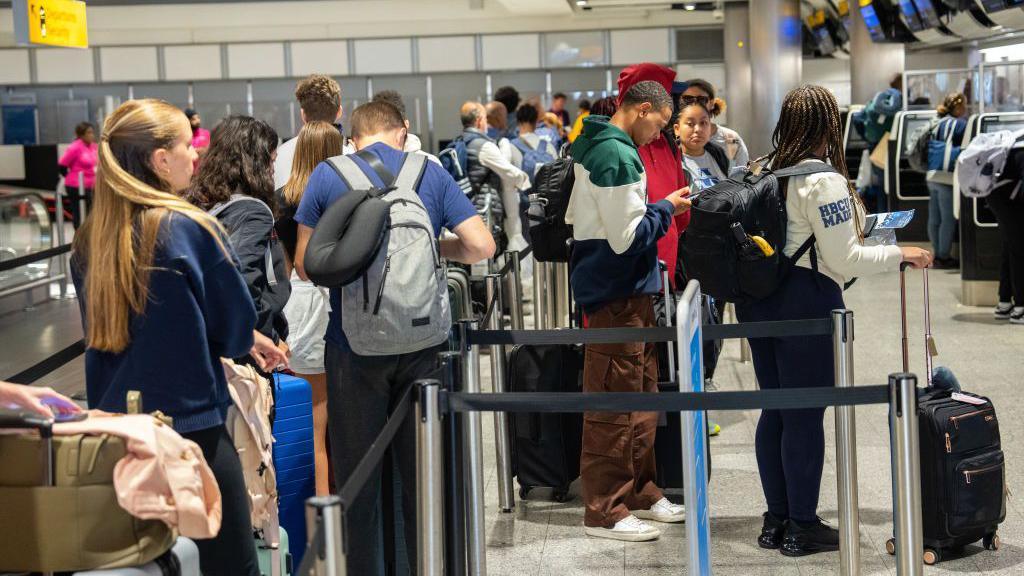A disruption within the UK’s air traffic control system triggered widespread disruptions at airports across the UK and internationally on Wednesday.
Though the technical fault lasted only 20 minutes, it resulted in the grounding of numerous planes nationwide, leading to approximately 150 flight cancellations and subsequent delays extending into Thursday.
The central question now revolves around the precise nature of the technological failure affecting this critical air traffic management system.
NATS, the organization responsible for managing all UK airspace and partly owned by the government, oversees flight operations arriving at and departing from the nation’s airports.
The organization has attributed Wednesday’s disruption to a “radar-related issue,” reportedly linked to the radar display system at its national air traffic control center in Swanwick.
NATS stated that the problem was “resolved by quickly switching to the back-up system.”
The organization emphasized that this recent incident differs from the major outage experienced in August 2023, which affected over 700,000 passengers and resulted in approximately 500 flight cancellations.
NATS implemented traffic reduction measures during Wednesday’s outage to prioritize safety. Furthermore, the organization stated that there is “no evidence” to suggest the incident was the result of a cyberattack.
Transport Secretary Heidi Alexander has confirmed that NATS has assured her the event was “an isolated incident, with no evidence of malign activity.”
NATS is conducting an internal investigation into the incident. However, a formal report will not be submitted to the Department for Transport.
Graham Lake, former director general of the Civil Air Navigation Services Organisation (CANSO), explained the significant impact of even a brief radar failure by comparing the NATS air traffic network to “national infrastructure.”
Speaking to the BBC, he stated, “Think of the network as motorways in the sky.”
He continued, “When you lose something like surveillance radar coverage for whatever reason, the capability of your network degrades to a country lane.”
“That’s why the systems slow down when there’s a technical failure.”
Airlines have voiced strong criticism of NATS, pointing out that this marks the second system failure since 2023.
Ryanair has called for the resignation of NATS chief executive Martin Rolfe, asserting that “no lessons” have been learned from the previous failure.
EasyJet expressed its “huge disappointment to see, yet again, the major failure within our air traffic control system which has let down a lot of customers with lengthy delays and, in some cases, cancellations.”
Passengers are advised to verify their flight information, as some have reported being temporarily stranded abroad due to the disruption.
Mr. Lake, speaking on the BBC’s Today program, defended Mr. Rolfe, arguing that technical failures are “inevitable” and that “the recovery was quick.”
He added that even with the 2023 issues, NATS has performed well “if you look at the minutes of outage over a period of years.”
However, air traffic control consultant Doug Maclean dismissed the notion that such faults are unavoidable as “nonsense,” noting that radars are backed up “almost everywhere in the country with dual if not triplicate coverage.”
He questioned, “Would you put up with that with your bank? Would you accept them saying that your salary has been sent to someone else?”
Mr. Maclean also criticized NATS’s lack of detailed explanation regarding the incident.
“Where else would a monopoly on a national service be allowed to have a failure like that and not be immediately transparent about what the failure was?”
Mr. Lake countered that NATS performs well compared to other countries, which also experience air traffic glitches, and that Wednesday’s issue was a matter of unfortunate timing.
“The UK airspace is very busy, certainly among the busiest in the world. We are at the busiest time of year and the failure yesterday was at the busiest time of day, so it’s not an ideal situation.”
Due to the congestion in UK airspace, the Heathrow Airlines Operators Committee, representing airlines operating from the airport, has advocated for additional runways in the southeast of England to enhance capacity.
The group’s chief executive, Nigel Wicking, acknowledged that “the NATS operational teams do a phenomenal job” but emphasized that the system is “running hot” and “when things go wrong and we lose the system for even an hour the impact is major.”
The UK government has stated its support for the expansion of Heathrow, Gatwick, and Luton airports, while critics argue that these plans would lead to increased emissions and air pollution.
Airlines are seeking answers following an air traffic control malfunction that resulted in the cancellation of 150 flights on Wednesday.
Concerns have surfaced regarding the availability of taxis in the city, especially during late-night hours.
A conclusive decision regarding the future of the West Midlands Cycle Hire scheme is expected later in the year.
We examine the diverse factors influencing eligibility for refunds in cases of cancelled or delayed flights.
A wheelchair user has expressed concerns about the “very uncomfortable” nature of lifts constructed as part of a £6.2m project.

